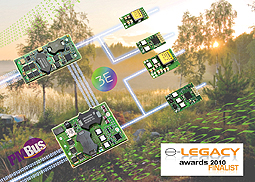
• Recognition for revolutionary 3E* concept contributing to reduce energy consumption
• First company to offer digitally controlled and PMBus compliant DC/DC power-modules for information and communication technology
• 3E* concept and Design for Environment working practices will contribute to reduce the carbon footprint of its products by 40% by 2013 from a 2008 baseline
Ericsson’s Power Modules entry in Electronic Product Design’s (EPD) coveted e-Legacy awards has been picked as a finalist in the hotly contested ‘Investment in the Environment Award’, Ericsson’s entry, its 3E* concept and Design for Environment working practices that will contribute to reduce the carbon footprint of Ericsson’s products by 40% by 2013 from a 2008 baseline.
EPD says that the winners in the e-Legacy awards are the companies that will build and shape the future of electronics. In 2010 there are seven award categories, all demonstrating corporate responsibility, investment in the future and an innovative approach to harnessing talent in electronics.
With its 3E* concept, Ericsson was the first company in the world to offer a complete on-board power solution (isolated + non-isolated) digitally controlled and PMBus compliant DC/DC power modules. Ericsson has a part of its strategy to reduce its environmental impact identified energy usage as a major focus area, and has set a carbon footprint reduction target to reduce emissions relative to products sold by an 40 percent by 2013 from a 2008 baseline, all from in-house activities and the life-cycle impacts of sold products. To reach the target, concrete targets in the area of energy efficiency, as well as philosophies minimising the environmental impact such as Design for Environment are key. Rising energy demands and associated costs, as well as environmental concerns are driving the demand for products with lower impacts and reduced footprint, and Ericsson Power Modules has demonstrated its commitment and capacity to deliver such products to the market.
“We focus on green innovation both in the research and design for future products and services, and in our ongoing activities to support our customers”, says Elaine Weidman Grunewald, Vice President, Sustainability & Corporate Responsibility, Ericsson. “We are pleased to be selected as finalist, which is a rewarding proof point that our ongoing commitment is recognized by important stakeholders.”
The Design for Environment (DfE) approach focuses on minimising the environmental impact of the products throughout their entire life cycle, with a particular emphasis on energy efficiency during the operational phase. Ericsson’s DfE policy drives the design and development of highly efficient DC-DC converters that decrease the energy consumption of end-user equipment by delivering efficiencies as high as 96.0 percent. High efficiency power-modules combined with Ericsson’s 3E* digital power control and management significantly reduce energy consumption, helping to reduce energy bills, along with reducing the total cost of ownership and the environmental impact.
*3E stands for Enhanced Performance, Energy Management, and End-user Value, the main benefits of the concept.
www.ericsson.com/powermodules


